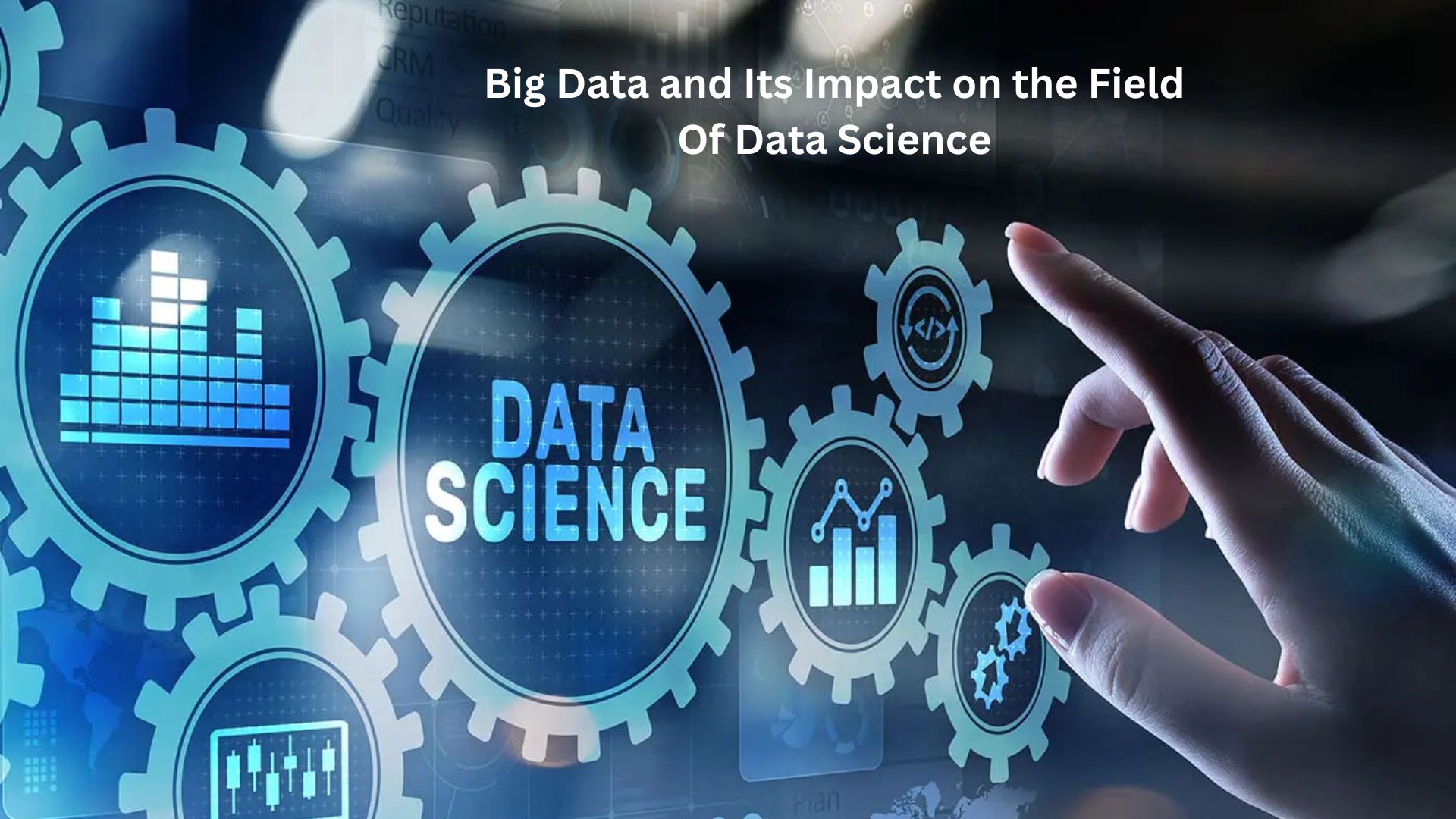Transformative Influence: The Impact of Big Data on the Field of Data Science

In the contemporary landscape of information technology, the term “big data” has emerged as a powerful force driving innovation and transformation across various industries. As organizations continue to accumulate vast amounts of data, the field of data science has risen to prominence, playing a pivotal role in extracting valuable insights from these colossal datasets. This blog delves into the transformative influence of big data and its impact on the field of Data Science, exploring its evolution, challenges, and opportunities, including the importance of Big Data Certification for beginners.
So, let’s get started with some definitions!
Big Data: Unveiling the Power of Information
In our digitally connected world, the term “big data” has become a buzzword, representing a revolutionary shift in how we generate, gather, and utilize information. But what exactly is big data, and why is it so significant? Let’s dive into the heart of this concept to uncover its meaning, implications, and impact.
Defining Big Data
At its core, big data refers to vast volumes of structured and unstructured data that are too complex for traditional data processing tools to handle effectively. It’s not just about the quantity of data; it encompasses its velocity, variety, and veracity as well. In other words, big data is characterized by:
Volume:
The sheer scale of data generated daily is astronomical. From social media posts and sensor readings to financial transactions and healthcare records, the volume of data is beyond what humans can comprehend.
Velocity:
Data streams in at an astonishing pace, often in real-time. Consider the rapid flow of social media posts, online transactions, and IoT sensor data—all generating information at lightning speed.
Variety:
Data comes in various formats, from structured data in databases to unstructured content like text, images, audio, and video. The diversity of sources adds complexity to data analysis.
Veracity:
Ensuring the accuracy and reliability of data is challenging. With data originating from different sources, trustworthiness becomes crucial to making informed decisions.
Big Data and Its Impact on the Field Of Data Science:-
The advent of big data has had a profound impact on the field of data science, transforming how data is collected, analyzed, and utilized to derive insights and make informed decisions.
Here are some significant ways that big data may impact the field of data science:
Increased Data Volume:
Big data refers to extraordinarily massive and complicated datasets that are difficult to handle or analyse using conventional data processing techniques. This abundance of data has challenged data scientists to develop new methods and tools to process and analyze data efficiently.
Advanced Analytics Techniques:
Big data and its impact on the field of data science influenced advanced analytics techniques. Traditional statistical methods often fall short when dealing with big data. As a result, data scientists have had to develop and utilize more advanced analytics techniques, such as machine learning, deep learning, and artificial intelligence, to extract meaningful insights from large datasets.
Real-Time Analysis:
Big data technologies enable real-time or near-real-time analysis of data streams. This capability is especially crucial for applications like financial trading, social media monitoring, and industrial IoT, where timely insights can drive immediate actions.
Data Variety:
Big data includes a variety of data kinds, such as structured, semi-structured, and unstructured data. This diversity has prompted data scientists to employ techniques that can handle different data formats, such as natural language processing (NLP) for unstructured text data and image recognition for visual data.
Data Velocity:
Big data often involves rapidly changing data streams that need to be processed quickly. This has led to the development of stream processing technologies that allow data to be analyzed as it’s generated, enabling real-time decision-making.
Data Quality and Preprocessing:
Big data and its impact on the field of data science have also influenced data quality and preprocessing. With the increase in data volume and variety, data quality and preprocessing have become critical. Data scientists must invest time in cleaning, transforming, and preparing the data before analysis to ensure accurate and reliable results.
Scalable Infrastructure:
Traditional databases and tools may not be sufficient to handle big data processing. Data scientists have turned to technologies like Hadoop, Spark, and cloud computing platforms to create scalable and distributed processing environments.
Privacy and Ethics:
The collection and analysis of big data raise concerns about privacy and ethical considerations. Data scientists must be mindful of how they handle sensitive data and ensure compliance with relevant regulations like GDPR (General Data Protection Regulation).
Predictive and Prescriptive Analytics:
Big data allows data scientists to develop more accurate predictive models and prescribe actionable insights. For instance, businesses can use customer behavior data to forecast trends and optimize their strategies.
Domain-Specific Applications:
Big data has enabled the emergence of domain-specific applications such as personalized medicine, recommendation systems, fraud detection, and supply chain optimization. These applications rely on data-driven insights to make complex decisions.
Data Monetization:
Big data has opened up new opportunities for organizations to monetize their data assets by offering data-driven products and services. This includes selling data to other businesses, developing data-driven APIs, or creating data-based subscription models.
In summary, Big Data and its impact on the field Of Data Science introduces both new opportunities as well as challenges. Data scientists have had to adapt by incorporating advanced analytics techniques, utilizing scalable infrastructure, addressing privacy concerns, and developing specialized applications to harness the power of big data for decision-making and innovation.
Evolution of Big Data and Data Science: A Symbiotic Relationship
The evolution of technology, coupled with the proliferation of digital platforms, has led to an exponential growth in data generation. However, the true potential of this data lies in its analysis and utilization, giving rise to the field of data science.
Data science is the art of transforming raw data into meaningful insights and predictions, often using a combination of statistical analysis, machine learning, and domain expertise. The emergence of big data has significantly enhanced the capabilities of data science, enabling professionals to explore complex patterns, uncover hidden correlations, and make data-driven decisions with unprecedented accuracy.
Challenges and Opportunities in the Big Data Era
While big data opens doors to unprecedented opportunities, it also presents significant challenges. The sheer volume of data can overwhelm traditional data processing techniques, necessitating the use of advanced technologies like distributed computing and cloud-based infrastructures. Ensuring data quality and maintaining privacy in a world awash with information are other major hurdles that data scientists must overcome.
Despite these challenges, big data also offers exciting possibilities for innovation. With the right tools and techniques, organizations can harness the power of data to enhance customer experiences, optimize business operations, and even develop groundbreaking products. Data science professionals are at the forefront of this revolution, armed with the skills to navigate the complexities of big data and extract insights that drive strategic decision-making.
Importance of Big Data Certification for Beginners
For individuals looking to embark on a journey into the realm of data science, obtaining a Big Data Certification for beginners is a crucial step. Such certifications validate a candidate’s expertise in handling and analyzing large datasets, utilizing cutting-edge tools, and applying advanced statistical techniques. As the industry becomes more competitive, having a recognized certification not only enhances employability but also signifies a commitment to professional growth and development.
A Big Data Certification equips beginners with foundational knowledge, including data preprocessing, machine learning algorithms, and data visualization techniques tailored for big data environments. It instills the confidence to tackle real-world challenges and enables practitioners to contribute effectively to projects that require leveraging big data for actionable insights.
Conclusion
As above we’ve discussed big data and its impact on the field of data science, we can conclude that in the ever-evolving landscape of data and technology, the synergy between big data and the field of data science has catalyzed a revolution that’s transforming industries and redefining how we perceive information. The journey from raw data to actionable insights has been accelerated by the advent of big data, opening doors to unprecedented opportunities and challenges alike.
As we stand at the crossroads of this data-driven transformation, the role of data science professionals becomes paramount. Navigating the complexities of big data, they decode intricate patterns, unravel hidden correlations, and unearth insights that steer organizations toward informed decisions. In this dynamic landscape, obtaining a Big Data Certification becomes more than a testament of skill—it’s a strategic investment in one’s career.
A Big Data Certification for beginners equips aspiring data scientists with the tools and techniques needed to navigate the labyrinth of data. It bridges the gap between theoretical knowledge and practical application, empowering beginners to harness the potential of big data and its impact on the field of data science. This certification not only reflects a commitment to professional growth but also signifies an individual’s dedication to mastering the skills needed to excel in this data-rich era.



